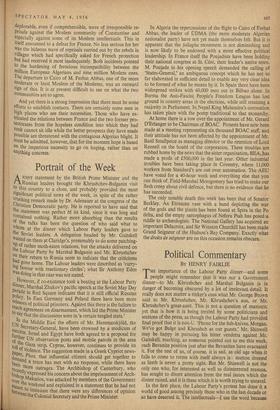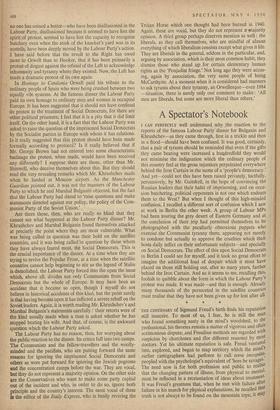Political Commentary
BY HENRY FAIRLIE THE importance of the Labour Party dinner—and some 1 people might remember that it was not a Government dinner—to Mr. Khrushchev and Marshal Bulganin is in danger of becoming obscured by a lot of irrelevant detail. It really does not matter a tinker's cuss what Mr. George Brown said to Mr. Khrushchev, Mr. Khrushchev's son, or Mr. Khrushchev's great-aunt. This is not a question of manners; yet that is how it is being treated by some politicians and sections of the press, as though the Labour Party had provided final proof that it is non-U. 'Phone for the fish-knives, Morgan. We've got Bulge and Khrushch as our guests.' Mr. Shinwell may be happy in pursuing his bitter vendetta against Mr. Gaitskell, reaching, as someone pointed out to me this week, each Bevanite position just after the Bevanites have evacuated it. For the rest of us, of course, it is sad, as old age when it fails to come to terms with itself always is : mutton dressed as lamb is never a pretty sight. But Mr. Shinwell is not the only one who, for interested as well as disinterested reasons, has sought to divert attention from the real issues which the dinner raised, and it is these which it is worth trying to unravel.
In the first place, the Labour Party's protest has done it a world of good among precisely those who in the last decade or so have deserted it. The intellectuals—I use the word because no one has coined a better—who have been disillusioned in the Labour Party, disillusioned because it seemed to have lost the spirit,of protest, seemed to have lost the capacity to recognise butchery even when the stink of the knacker's yard was in its nostrils, have been deeply moved by the Labour Party's action. I have said before that the revolt to the Right has owed more to Orwell than to Hooker, that it has been primarily a protest of disgust against the refusal of the Left to acknowledge inhumanity and tyranny where they existed. Now, the Left has made a dramatic protest of its own again.
In Homage to Catalonia Orwell paid his tribute to the ordinary people of Spain who were being crushed between two equally vile systems. At the famous dinner the Labour Party paid its own homage to ordinary men and women in occupied Europe. It has been suggested that it should not have confined its protest to the treatment of Social Democrats, for there are other political prisoners; 1 feel that it is a pity that it did limit itself. On the other hand, it is a fact that the Labour Party was asked to raise the question of the imprisoned Social Democrats by the Socialist parties in Europe with whom it has relations. Is it really suggested that this protest should have been made formally according to protocol? Is it really believed that if Mr. George Brown had not entered into some characteristic badinage the protest, when made, would have been received any differently? I suppose there are those, other than Mr. Shinwell, who deceive themselves about this. But they should read the very revealing remarks which Mr. Khrushchev made when he landed at Moscow airport. As the Manchester Guardian pointed out, it was not the manners of the Labour Party to which he and Marshal Bulganin objected, but the fact that the Labour Party had dared to 'raise questions and make statements directed against our policy, the policy of the Com- munist Party of the Soviet Union.'
Are there those, then, who are really so blind that they cannot see what happened at the-Labour Party dinner? Mr. Khrushchev and Marshal Bulganin found themselves attacked at precisely the point where they are most vulnerable. What was being called in question was their hold on the satellite countries, and it was being called fin question by those whom they have always feared most, the Social Democrats. This is the crucial importance of the dinner. At a time when they are trying to revive the Popular Front, at a time when the satellite countries cannot help beginning to stir as the legend of Stalin is demolished, the Labour Party forced into the open the issue which, above all, divides not only Communists from Social Democrats but the whole of Europe. It may have been an accident that it became so open, though I myself do not believe in historical accidents of this kind, but the point surely is that having become open it has inflicted a severe rebuff on the Soviet leaders. Again, it is worth reading Mr. Khrushchev's and Marshal Bulganin's statements carefully : their retorts were of the kind usually made when a man is asked whether he has stopped beating his wife. And that, of course, is the awkward question which the Labour Party asked.
The Labour Party has no reason, then, for worrying about the public reaction to the dinner. Its critics fall into two camps. The Communists and the fellow-travellers and the woolly- minded and the patifists, who are putting forward the same reasons for ignoring the imprisoned Social Democrats and others as were put forward for ignoring the Jewish pogroms and the concentration camps before the war. They are vocal, but they do not represent a majority opinion. On the other side are the Conservatives who want to make some party capital Out of the incident and who, in order to do so, ignore both principle and the country's interest. The most vocal of these is the editor of the Daily Express, who is busily reviving the Trojan Horse which one thought had been burned in 1940. Again, these are vocal, but they do not represent a-xiajority opinion. A third group perhaps deserves mention as well : the liberals, as they call themselves, who are mindful of almost everything of which liberalism consists except what gives it life. They are liberals in the general, seldom in the particular, and, arguing by association, which is their most common habit, they dismiss those who stand .up for certain elementary human rights as the 'Poujadist fringe.' Not long ago they were accus- ing, again by association, the very same people of being McCarthyite. At a moment when it is considered bad manners to ask tyrants about their tyranny, an Orwellesque—even 1984 —situation, there is surely only one comment to make : 'All men are liberals, but some are more liberal than others.'











































 Previous page
Previous page